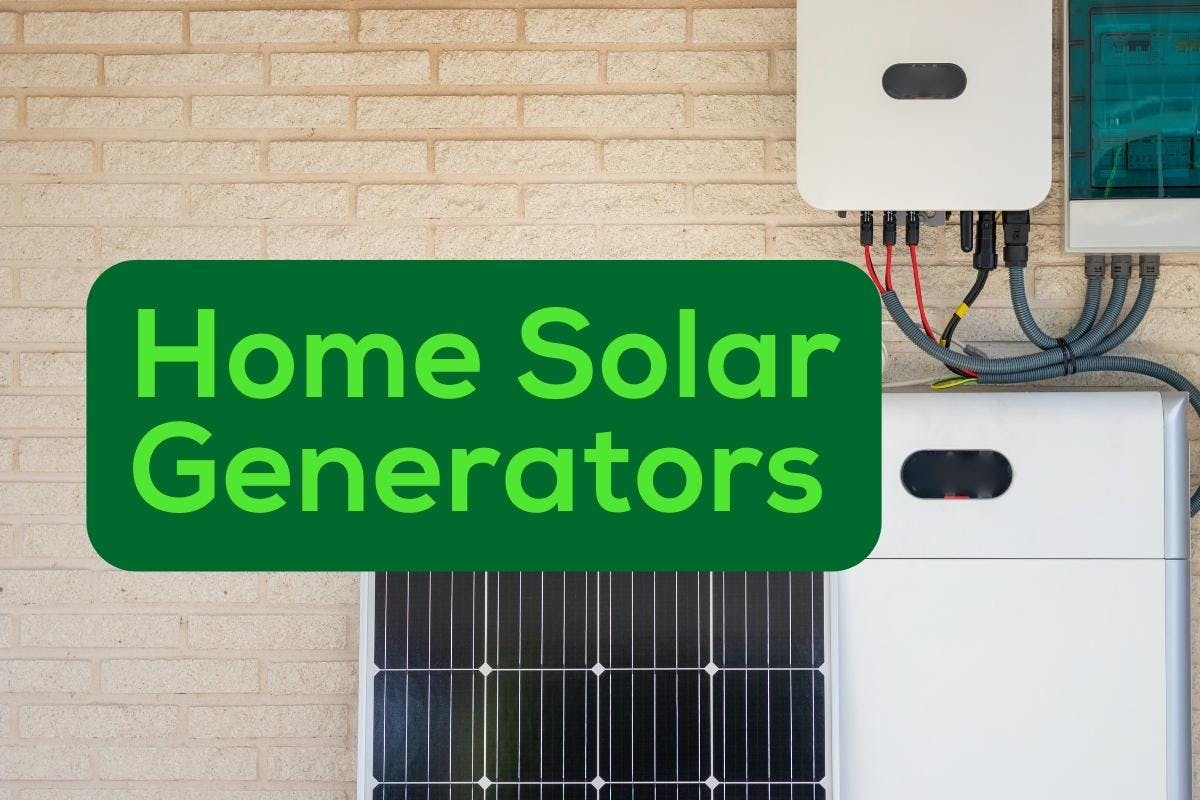Solar-Powered Generators: A Quiet, Clean, Backup Alternative
Last edited

Author
Andrew Blok
Electrification and Solar Writer and Editor

Editor
Ryan Barnett
SVP, Policy & New Market Development

Power outages due to bad weather have risen in recent years and the average American had the power go out for 5.5 hours in 2022.
The impact of a power outage can range from annoying to dangerous. Until recently, the only solution was a gas- or diesel-powered generator. Now, cleaner and quieter options powered by the sun offer an alternative. Whether you’re looking for a portable solar power solution or a home backup battery powered by home solar panels, here’s what you need to know.
See how much you can save with home energy changes
What Is a Solar-Powered Generator?
The term solar generator most often describes smaller batteries (often portable) with attached solar panels, but we’ll cover any device that converts sunlight into usable electricity. With rapid developments in photovoltaic solar and lithium-ion storage technology over the past two decades, solar-powered generators have become increasingly capable, available, and popular for a wide variety of electricity applications.
Solar generators have a few key components.
Solar input: Using a charge controller, solar generators safely convert solar energy into electricity that can be stored in a battery and used onsite. For a solar generator to work, the device must be wired into a solar panel array, though many devices can also be charged using alternative power sources such as grid electricity.
Solar battery storage: The electricity generated by the panels is stored in an electrochemical battery. Most modern solar batteries utilize lithium-ion technology for efficient charging and discharging as well as long product lifespans.
Power inverter: A power inverter converts stored solar energy into alternating current (AC), which is the form of electricity used by most household devices. Rated with “continuous” and “surge” wattages, inverters determine the maximum amount of power you can draw from a solar battery at any given time.
Energy output: Most solar generators are manufactured with several outlets and ports to power and charge various electronics and appliances directly on the system. Solar generators for residential backup power can also be connected to your home’s electric panel with a transfer switch so the energy can be distributed throughout your property.
Types of Solar Generators
Sold in many different sizes and with varying capabilities, solar-powered generators range from hand-held to larger than your dishwasher, with products made specifically for portable power, home use, or a combination of the two.
Portable: Small enough to move around, portable solar generators can fit in your hand or be big enough to need wheels to move. Their solar component is often portable, too, so you can charge up on the go. All sizes may not be capable of powering any device, so finding the right size requires balancing capacity and portability.
Some portable devices are so large they can serve the purpose of a home backup battery, without being permanently installed. They’re less common and only technically portable — you won’t be taking one camping — but could be an option for people who need hefty backup power, but don’t want it tied to their homes.
Home backup: Integrated with your home’s wiring, these batteries aren’t going anywhere. Depending on the cumulative size of your battery, they can keep at least part of your home powered up during a blackout, or let you avoid buying some of the utility electricity you otherwise would.
The Benefits of a Home Solar Generator
Here are some of the benefits solar generators offer.
Backup power: When installed with an automatic transfer switch, solar generators can seamlessly activate as soon as an outage is detected, minimizing power loss for critical devices like your fridge, lights, and modem.
Portability: It’s not true for stationary home batteries like the Tesla Powerwall, but some solar generators are highly portable. Depending on how much power you need, they may be easier to move than a portable generator. With portable solar panels, you may be able to charge up wherever you go.
Volume: Batteries and solar generators are nearly silent, much quieter than gas generators.
Cleaner: Solar generators don’t exhaust fumes and don’t come with carbon monoxide risks.
Better user experience: On top of quiet and clean operation, solar generators let you skip trips to the gas station and oil changes. You can also safely take them indoors, something you should never do with a gas generator.
Operating cost: They might cost more up front, but they’ll cost less to run, since you can recharge them with free solar energy. Depending on how often you use them, that can be a significant savings.
See how much you can save with home energy changes
Solar Powered Generators vs Gas Generators
As an alternative to traditional residential backup systems run by diesel, propane, or natural gas, solar-powered generators offer a greener, easier, and potentially cheaper experience for homeowners today. Here’s how they compare.
| Solar generator | Gas generator |
|---|---|
| Quiet | Loud |
| No dangerous fumes | Risk of dangerous fumes |
| Very low charging cost | Fuel cost follows gas prices |
| Can be very portable | Can be portable |
| Minimal maintenance | Maintenance required |
Are Solar Powered Generators Worth it?
Providing safe and reliable, emission-free electricity, solar generators are worth it for homeowners searching for a sustainable backup power source. Although most whole-home systems require large upfront investments (especially when compared to gas-powered alternatives), today’s advanced solar-powered generators can provide long-term energy security.
How to Find the Right Solar Generator
Not all solar generators are built equally, so when choosing the best device for your home, the following considerations should be taken.
Home compatibility check: Most portable solar-powered generators are not designed for home use, so ensure the generator you purchase can be safely connected to your property’s electrical panel, if that’s your goal. Work with a certified electrician to install your whole-home solar generator or battery backup.
Storage and inverter capacity: The size of your solar generator’s battery bank and inverter capacity will determine how much energy you can store or use at any given time. While higher battery and inverter capacities will be able to power your home’s electric devices for longer, larger and more capable generators also include increased price tags.
Brand reputation and warranty coverage: Consider warranty coverage and length. Portable solar generators from companies such as Bluetti, Ecoflow, and Renogy often offer 5-year warranties, while large home batteries from companies such as Tesla or Enphase often cover 10 years.
Product bonus features: When comparing solar generators head-to-head, certain product features can help differentiate your options to best fit your unique buying factors. For example, modular battery storage options can help expand energy reserves for homes with higher power demand, just as a solar generator on wheels may be the best solution for homeowners seeking easy system portability.
If you’re interested in exploring standalone battery storage or pairing it with solar, reach out to a Palmetto expert or explore our solar savings estimator.
See what home electrification can do for you:
Frequently Asked Questions
Can a solar generator run a house?
Backup batteries commonly backup critical loads through a power outage, not the entire house. Installing more battery capacity can let you back up more of your home, but at a cost. Some small solar generators are suited only to charging devices or running small ones.
Is a solar generator different from a solar battery?
The two terms typically refer to two different things. Solar battery usually means stationary batteries wired directly into your home. Solar generator often refers to portable batteries and solar panels. Size and portability are the main differences.
Are solar generators worth it?
Solar generators can be worth it if you experience frequent power outages, have a need for portable power, or are just interested in the technology. Whether they’re worth it depends on your needs and budget.



